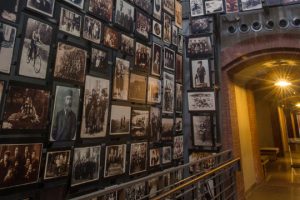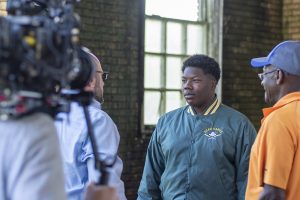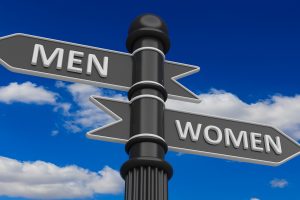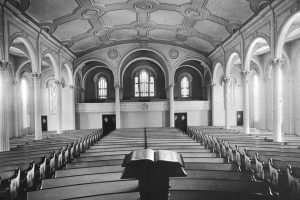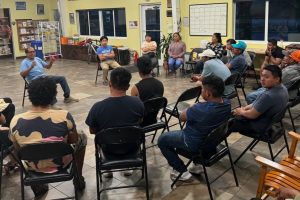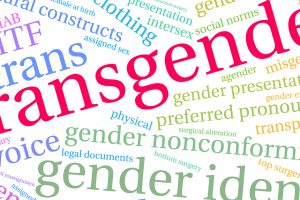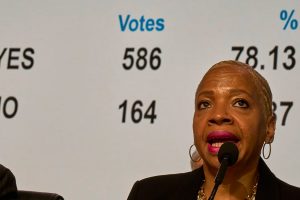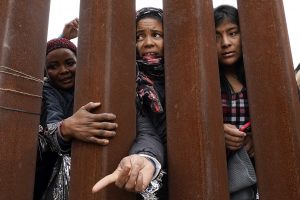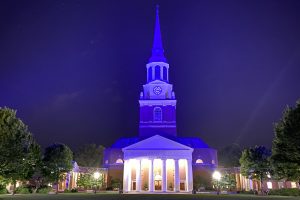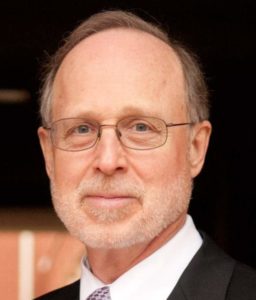 I wrote this column as friends and family of John Sidney McCain III were gathering at the Naval Academy in Annapolis, Maryland, for the third of three highly publicized funerals and the senator’s final place of rest.
I wrote this column as friends and family of John Sidney McCain III were gathering at the Naval Academy in Annapolis, Maryland, for the third of three highly publicized funerals and the senator’s final place of rest.
Although McCain made two failed runs for the White House, he has been celebrated in death far more than any president I can remember. In fact, politicians from both parties have been locked in a competition to see who could give their fallen comrade the most glowing endorsement.
I suspect all the eulogizing has said more about the current state of American politics than about McCain. The headline for Susan Glasser’s story in The New Yorker captured the defiant spirit at the National Cathedral perfectly: “John McCain’s Funeral Was the Biggest Resistance Meeting Yet.” Glasser wrote:
Donald Trump’s name was never mentioned. It didn’t have to be. The funeral service for John Sidney McCain III at the Washington National Cathedral on a swampy Saturday morning was all about a rebuke to the pointedly uninvited president of the United States – which was exactly how McCain had planned it. Trump was explicitly barred from all three of the McCain memorial services. McCain planned that too.
The senior senator from Arizona was eulogized as a leader who always appealed to “the better angels of our nature.” Abraham Lincoln’s famous phrase suggests that some of our angels are better than others. We have better angels and we have bitter angels. If John McCain typifies the former, Donald Trump personifies the latter. At least that’s the way the folks invited to the service at Washington’s National Cathedral saw it.
But were the details of McCain’s life worthy of the bipartisan accolades he has received in eulogies far and wide? Not really.
By his own admission, McCain was a problem child. His father and his grandfather were both celebrated admirals. John Sidney McCain III was expected to follow in their footsteps. It was a given that no one, including young John himself, ever questioned.
Still, no matter how badly McCain III messed things up he was always given another chance. Barriers to advancement were swept away by unseen hands.
Like George W. Bush, the young McCain couldn’t seem to fail, even when he gave it his best shot. He earned a reputation as a womanizer, a slacker, a hard drinker and a profanity spewing fighter who came out swinging in response to the slightest slight. He admitted that a touch of Napoleon syndrome may have played a role. His official height was five-foot-nine, but friends said he was three inches shorter. McCain was a spectacular screw-up at both the exclusive private school where he spent his high school years and at the Naval Academy. In fact, during his turbulent years there, McCain came perilously close to expulsion on numerous occasions, graduating 894th in a class of 899.
McCain settled down following his 1964 marriage to Carol Shepp, a vivacious former swimsuit model. He took flight training but was more interested in the night life than his lessons. However, as the Vietnam War heated up, he volunteered for active service as a fighter pilot. By this time, his father, Jack McCain, had been appointed as commander-in-chief of the U.S. naval forces in Europe and stationed in London.
His father’s rapid advance in rank made the younger McCain a media favorite.
In July 1967 he narrowly escaped death when a horrendous explosion and fire on the deck of the USS Forrestal aircraft carrier claimed 137 lives. Days later, while unwinding in Singapore, McCain told R.W. Apple of the New York Times: “Now that I’ve seen what the bombs and the napalm did to the people on our ship, I’m not so sure that I want to drop any more of that stuff on North Vietnam.”
But McCain was soon back in the fray and, as anyone who follows the news is now aware, he was shot down over Hanoi. As his plane spiraled to earth, he ejected at high speed, fracturing both arms and his right leg.
“The late senator from Arizona may seem like an odd poster boy for our better angels.”
Shortly after McCain landed in the infamous prisoner of war camp known as “the Hanoi Hilton,” his father was named commander of all U.S. forces in the Vietnam theater. Eager for a propaganda coup, the North Vietnamese tortured their famous prisoner mercilessly, but his status as a prized bargaining chip also provided his captors with a strong incentive for keeping him alive. The first two years of solitary confinement and frequent beatings were far worse than the last three years of McCain’s captivity. His treatment, though still horrible, improved significantly following the death of Ho Chi Minh and, after his release in 1973, he was able to walk with crutches.
McCain’s years of captivity are often portrayed as a period of brutal evolution from spoiled brat to humble public servant. In his books and frequent interviews, McCain sometimes distanced himself from this simplistic narrative; but when it suited his purposes he made the most of it. In his convention speech in 2008, for instance, McCain claimed that, after his years as a POW, “I wasn’t my own man anymore. I was my country’s. My country saved me, and I cannot forget it.”
In 2008, after combing through the Republican nominee’s every utterance on the subjects of religion and patriotism, Yale professor Kathryn Lofton concluded that McCain’s real religion was a romantic, semi-mystical vision of America. He was always reluctant to share his religious convictions, but his writings and speeches overflow with unrestrained paeans to the American ideal. In McCain’s final words to the nation, we were urged to “believe in the promise and greatness of America, because nothing is inevitable here. Americans never quit. We never surrender. We never hide from history. We make history.” The appeal was evangelistic; the deity was a mystical, transcendent version of America.
“McCain’s conservatism repeatedly placed him on the wrong side of history.”
Shortly after returning from Vietnam, McCain was introduced to Richard Nixon, a man he revered, and quickly embraced by heavy hitters like Ross Perot and the Reagans.
Although he was now technically unfit for service (he couldn’t lift his arms high enough to comb his hair), McCain still tried to advance his naval career. When it became obvious that he would never make the rank of admiral, he returned to the civilian world to pursue a career in politics.
On the surface, John and Cindy McCain appeared to be happily married. But John’s treatment of Carol was abominable from the moment they were reunited. Carol was no longer the tall, slender woman John remembered. On Christmas Eve 1969, while visiting family in the Philadelphia region, her car hit some ice, skidded off the road and hit a power pole at high speed. Carol was thrown through the windshield and the vehicle came to rest on top of her. Her legs were damaged so badly that doctors considered amputation. Twenty-three horrific operations later, Carol’s body was disfigured; she had dropped five inches in height, and, due to inactivity, had put on a lot of weight.
McCain called his treatment of Carol “my greatest moral failure,” and so it was. Interviews with friends suggest that he immediately returned to his womanizing ways and, seven years after being reunited with his family, McCain was introduced to Cindy Hensley, a woman 18 years his junior.
“McCain called his treatment of Carol ‘my greatest moral failure,’ and so it was.”
While still living with Carol, John filed for divorce and applied for a marriage license almost simultaneously. Ronald and Nancy Reagan, close friends of Carol McCain, never forgave John for his shabby behavior. His children refused to attend his wedding.
Although the newlyweds were smitten with one another, the fact that Cindy was from a wealthy, politically-connected Arizona family made John look like an unprincipled opportunist; a reputation he was never able to shake.
From the time he abandoned his naval career, McCain harbored presidential ambitions. That meant courting people of wealth and influence. His father-in-law’s money and connections were a good start, but soon John and Cindy were enjoying frequent vacations on Charles Keating’s island resort. It was eventually revealed that McCain was one of five senators who had received generous campaign contributions from Keating in exchange for assistance with regulators. When Keating’s over-leveraged Lincoln Savings and Loan Association collapsed, tax payers were left with a $4 billion liability.
McCain resurrected his reputation by working with liberal Democrat Russ Feingold to place strict limits on soft-money political contributions. Although the McCain-Feingold Act was eventually gutted by the Supreme Court, it established the Arizona senator’s reputation as a corruption fighter.
“McCain pointed us to the better angels of our nature and many of us loved him for it.”
McCain’s willingness to reach across the aisle to Democrats damaged his reputation with more ideologically consistent Republicans like Ronald Reagan, Barry Goldwater and Ross Perot. McCain was a favorite target of media conservatives like Rush Limbaugh. Nonetheless, McCain always called himself a Reagan Republican, and that’s pretty much what he was. He had imbibed the tenets of pro-business, low-tax, pro-military conservatism with his mother’s milk.
But McCain’s conservatism repeatedly placed him on the wrong side of history. For years, he defended America’s involvement in Vietnam until that position became untenable. He beat the drum for invading Iraq and was convinced that the country was brimming with weapons of mass destruction.
McCain voted to cut banking regulation until the financial crisis forced a change of heart.
And McCain’s record on civil rights was uniformly bad. He supported George H.W. Bush’s veto of the 1990 civil rights bill, he voted against the creation of a Martin Luther King holiday in 1983, and once opposed the removal of civil war monuments in the South. McCain insisted on referring to his torturers as “gooks” even after it was explained that slur has little to do with behavior and everything to do with Asian ancestry.
Most damaging of all, in the minds of many, McCain chose Sarah Palin as his 2008 running mate. Palin fired up the Republican base but her weak grasp of policy detail and the grassroots rage she unleashed reflected badly on the head of the ticket. Did McCain witness Palin’s success and see an opportunity?
But McCain was willing to admit his mistakes – most of the time. He never tried to justify his treatment of Carol McCain; he renounced his vote on the MLK holiday, reversed himself on the civil war monuments issue and even defended Colin Kaepernick’s right to kneel in protest of police brutality and racial injustice. Moreover, McCain consistently supported comprehensive immigration reform and opposed the use of torture. He made frequent trips to the site of his captivity and encouraged the restoration of diplomatic relations with Vietnam.
In his final years, McCain emerged as an outspoken critic of Trumpian politics.
McCain’s frequent reversals, his lack of ideological consistency and his willingness to turn on a dime when he knew he was wrong make him the perfect character foil for Trump. McCain pointed us to the better angels of our nature and many of us loved him for it. Even Carol McCain stood by her man, even if he deserved nothing but her contempt. She didn’t attend his memorial services in Arizona and Washington, but she was in Annapolis to say goodbye one more time.
“Our ‘best angels’ are confined to heaven. The earth-angels available to us only come in two flavors: bitter and better.”
The late senator from Arizona may seem like an odd poster boy for our better angels. He was deeply flawed, vacillating, undisciplined, irascible, profane and deeply compromised. But when you read Lincoln’s first inaugural address in context, the better angels of our nature are all about compromise. Lincoln starts out reassuring Southerners that slaves who flee to free states will be captured and returned. The Great Emancipator declares that his administration has no intention of ending slavery where it presently exists.
The Address concludes with a plea for compromise. We are not enemies, but friends. We must not be enemies. Though passion may have strained it must not break our bonds of affection. The mystic chords of memory, stretching from every battlefield and patriot grave to every living heart and hearthstone all over this broad land, will yet swell the chorus of the Union, when again touched, as surely they will be, by the better angels of our nature.
Was Lincoln really willing to sign off on slavery so long as it was confined to the South? Yes, he was. One third of the American population was committed to the perpetuation and geographical extension of America’s peculiar institution and Lincoln couldn’t shake this commitment. It was either compromise or war. Both options were awful, but Lincoln was willing to swing either way.
Our “best angels” are confined to heaven. The earth-angels available to us only come in two flavors: bitter and better.
Today, 157 years after Lincoln appealed to our better angels, our nation remains divided. One third of the American population loves the white nationalism Donald Trump brings to the table and nothing, is seems, can shake that commitment. For conservatives like John McCain, it was either compromise or resistance. Both options (from a Republican perspective) were awful, but McCain was willing to play it either way.
John Sidney McCain III was no saint, but he treated his enemies like friends. And in a messy and divided world like ours, that may be as good as it gets.


